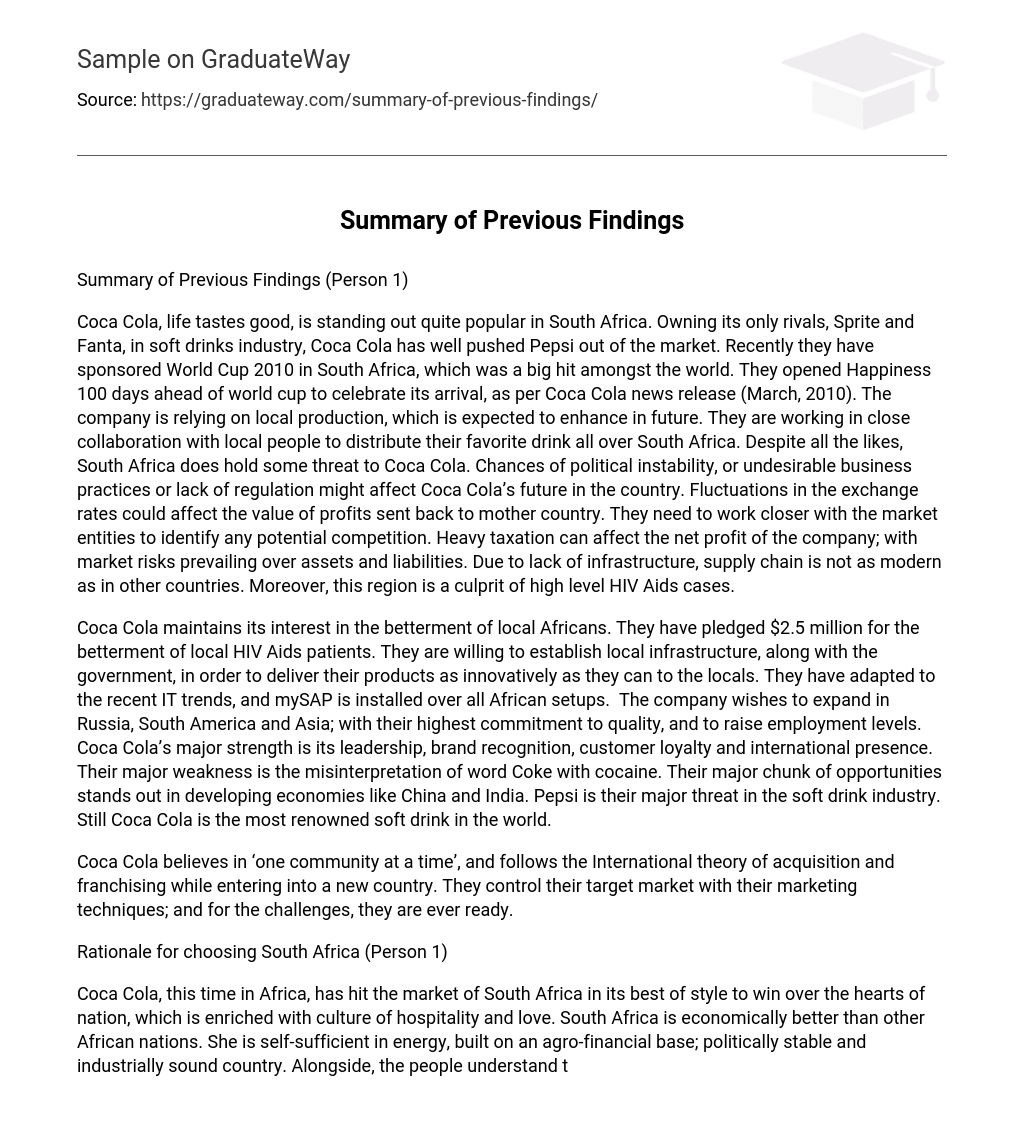Coca Cola, life tastes good, is standing out quite popular in South Africa. Owning its only rivals, Sprite and Fanta, in the soft drinks industry, Coca Cola has well pushed Pepsi out of the market. Recently they have sponsored World Cup 2010 in South Africa, which was a big hit amongst the world. They opened Happiness 100 days ahead of the world cup to celebrate its arrival, as per Coca Cola news release (March, 2010). The company is relying on local production, which is expected to enhance in the future. They are working in close collaboration with local people to distribute their favorite drink all over South Africa. Despite all the likes, South Africa does hold some threat to Coca Cola. Chances of political instability, or undesirable business practices or lack of regulation might affect Coca Cola’s future in the country.
Fluctuations in the exchange rates could affect the value of profits sent back to the mother country. They need to work closely with the market entities to identify any potential competition. Heavy taxation can affect the net profit of the company; with market risks prevailing over assets and liabilities. Due to lack of infrastructure, supply chain is not as modern as in other countries. Moreover, this region is a culprit of high level HIV Aids cases.
Coca Cola maintains its interest in the betterment of local Africans. They have pledged $2.5 million for the betterment of local HIV Aids patients. They are willing to establish local infrastructure, along with the government, in order to deliver their products innovatively as they can to the locals. They have adapted to the recent IT trends, and my SAP is installed over all African setups. The company wishes to expand in Russia, South America and Asia; with their highest commitment to quality, and to raise employment levels. Coca Cola’s major strength is its leadership, brand recognition, customer loyalty and international presence. Their major weakness is the misinterpretation of word Coke with cocaine. Their major chunk of opportunities stands out in developing economies like China and India. Pepsi is their major threat in the soft drink industry. Still Coca Cola is the most renowned soft drink in the world.
Coca Cola believes in ‘one community at a time’, and follows the International theory of acquisition and franchising while entering into a new country. They control their target market with their marketing techniques; and for the challenges, they are ever ready.
Coca Cola, this time in Africa, has hit the market of South Africa in its best of style to win over the hearts of a nation, which is enriched with culture of hospitality and love. South Africa is economically better than other African nations. She is self-sufficient in energy, built on an agro-financial base; politically stable and industrially sound country. Alongside, the people understand their environmental responsibilities, and are responsive to the problem of industrial pollution. The government weighs infrastructure, health and safety as their highest priority. Though the country is developing, but the government is clear in its intentions, so is Coca Cola. This is the reason why Coca Cola has seen 7% growth rate in consumption per year, according to Global Data Systems (2009).
South Africans have a lot of potential for international businesses. They follow an investment friendly policy to attract foreign investments. Moreover, economically, they’re doing well. They have trade agreements with many developed countries, which serve as most of the market for their export items. So a lot of economic activity is expected over the years as South Africa continues to progress. Important for stability, they are a terrorist-free state. The potential is there to be taken; Coca Cola just has to do it the African way.
References
- Coca Cola News Release (2010) Coca-Cola South Africa Opens Happiness 100 Days ahead of the 2010 FIFA World Cup August 5, 2010 http://www.coca-cola.co.za/upload/documents/news/20100302_MR_Systems_motivation_100_Days.pdf
- Global Data Systems (2009) Coca-Cola’s Sponsorship of 2010 FIFA World Cup in South Africa – A Great Opportunity to Grow Sales in Africa. August 5, 2010 http://www.thefreelibrary.com/Coca-Cola’s+Sponsorship+of+2010+FIFA+World+Cup+in+South+Africa+-+A…-a0208591944
- The Coca Cola Company. (2006-2009). Hiv/aids. Retrieved July 25, 2010, from http://www.thecoca-colacompany.com/citizenship/hiv_aids.html





